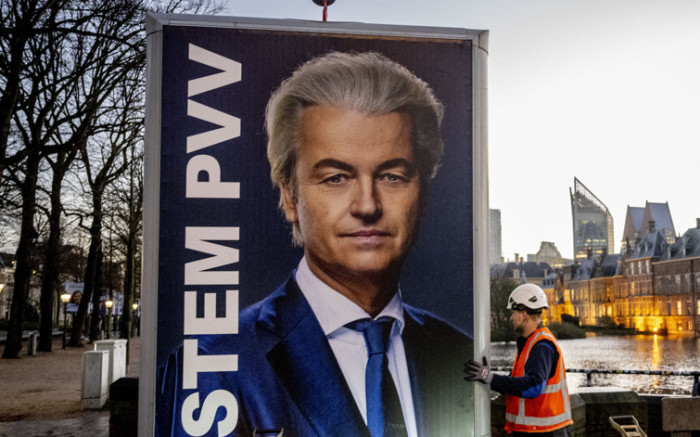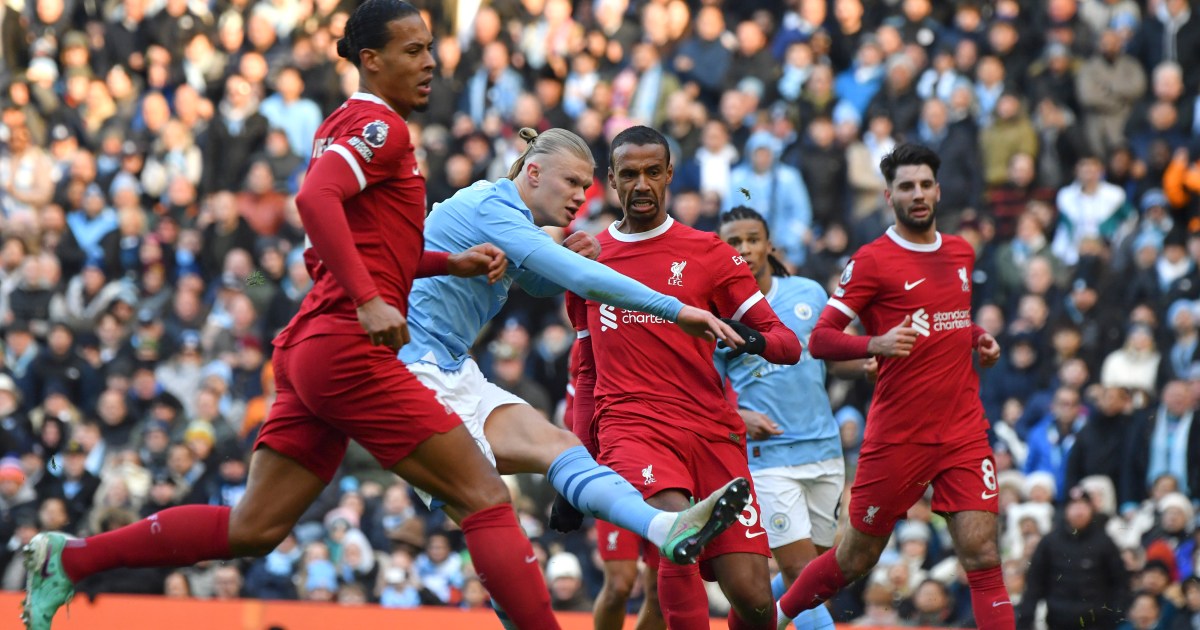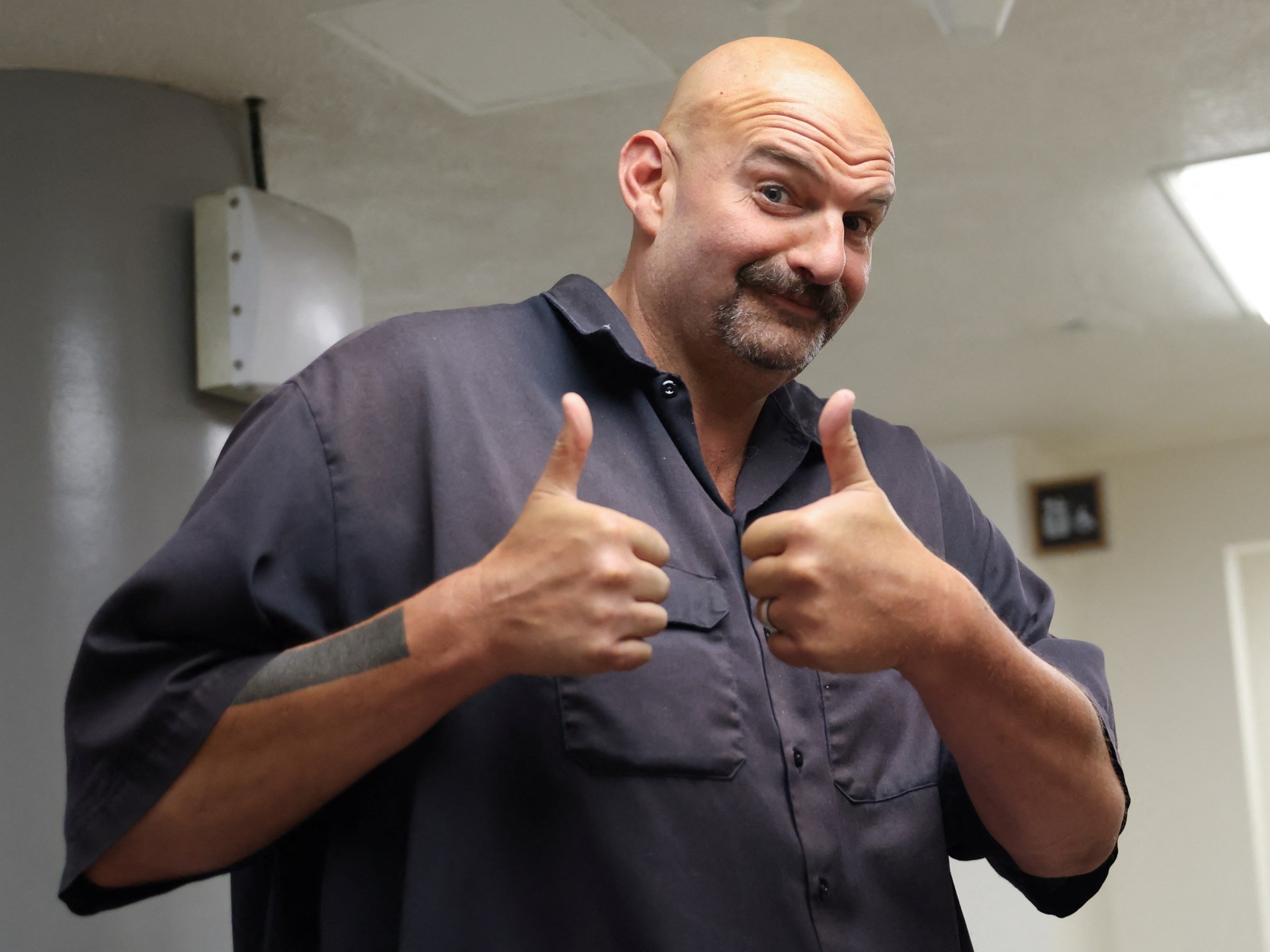
A left-wing bloc was far behind with 25 seats, while the center-right VVD got 24 seats, a disastrous result for outgoing Prime Minister Mark Rutte’s party.
Workers prepare to remove an election sign of the Party for Freedom (PVV) leader Geert Wilders near the Binnenhof, a day after the Dutch general election in The Hague on November 23, 2023. Image: AFP
THE HAGUE, NETHERLANDS (AP) — Far-right hothead Geert Wilders urged his shaken political rivals on Thursday to find common ground to govern the country after an election victory that caused a stir in the Netherlands and Europe turned out to be a bombshell.
According to the near-complete results, his PVV (Freedom Party) won 37 seats in parliament, more than doubling its share from the last election and trumping its opponents.
A left-wing bloc was far behind with 25 seats, while the center-right VVD got 24 seats, a disastrous result for outgoing Prime Minister Mark Rutte’s party.
Wilders, 60, now faces the daunting task of trying to form a working coalition while wooing rivals who had categorically ruled out joining a PVV-led government before the vote.
“The voters have spoken. The seats are fixed. Now it’s important that we look for things we can agree on,” said Wilders, toasting his election success with a glass of champagne.
The unexpected victory sparked immediate congratulations from other far-right leaders in France and Hungary, but is likely to raise fears in Brussels – Wilders is anti-EU and wants to vote on a “Nexit” to leave the bloc.
Although he toned down his Islamophobic rhetoric during the campaign, the PVV platform promises a ban on the Koran, mosques and Islamic headscarves, and Muslim community leaders in the Netherlands were quick to voice their concerns.
“I woke up this morning feeling uncomfortable. Actually also in shock,” Habib el Kaddouri from the SMN Association of Moroccan Dutch told AFP.
“Some people are afraid, others are uncertain about their future and what the result means for their citizenship or their place in Dutch society,” he added.
However, Burak Cen, a 40-year-old taxi driver, said he did not vote but would have voted for Wilders.
“I think he deserves a chance,” he told AFP.
“To be honest, I think he just wants to attract votes with his propaganda about mosques and Muslims. But otherwise, what he says about the Dutch and poverty is correct,” Cen added.
TSUNAMI
Wilders addressed cheering supporters after the election in The Hague and ratcheted up his anti-immigrant rhetoric. He said the Dutch had voted to curb the “tsunami” of asylum seekers.
He later told reporters he wanted to be “prime minister for all Dutch people” and would “work hard with other parties” to form a coalition.
But it is unclear how he can muster the 76 seats he needs for a majority in the 150-seat parliament.
Former European Commissioner Frans Timmermans, whose Greens-Labour faction came second, immediately ruled out cooperation, saying it was now their job to “defend democracy” in the country.
Anti-corruption campaigner Pieter Omtzigt, whose New Social Contract party won 20 seats, appears certain to play a role and hinted he was “available” for talks but admitted they would not be easy.
Dilan Yesilgoz, who led the center-right VVD to a disappointing 24 seats, was cautious on election night, saying Wilders would have to see if he could forge a coalition.
She initially opened the door for Wilders to join a VVD-led government, but stressed that she would not serve under him.
“It’s entirely up to the VVD,” said Sarah de Lange, a professor of political pluralism at the University of Amsterdam.
“A big question will be who will be prime minister, because with Wilders as prime minister, the Netherlands has an impossible situation internationally,” she added.
WINDS OF CHANGE
The Netherlands’ shift to the right comes after Italy elected Giorgia Meloni as prime minister.
Hungary’s nationalist Prime Minister Viktor Orban hailed “winds of change” after the exit poll, while France’s Marine Le Pen hailed his “spectacular performance.”
And although Wilders promised to become prime minister “for all Dutch people,” his anti-Muslim rants in the past have earned him the nickname “Dutch Trump” – also a reference to his dyed, slicked-back hairstyle.
He was found guilty of discrimination in 2016 after leading a crowd chanting for “fewer” Moroccans in the Netherlands. He previously compared the Koran to Adolf Hitler’s Mein Kampf and said both books should be banned.
With typical Wilders rhetoric, the PVV manifesto states: “Asylum seekers enjoy delicious free cruise buffets, while Dutch families have to cut back on their grocery purchases.”
A “binding referendum” should be held on “Nexit”, i.e. the Netherlands’ exit from the EU. The PVV also calls for an “immediate stop” to development aid.
The Dutch media went wild over Wilders’ victory.
“Nobody expected this, not even the winner himself,” said the daily Trouw. Even the normally calm public broadcaster NOS called it a “monster victory”.
The Financial daily newspaper said the result “turns politics in The Hague on its head,” while the NRC The daily described it as a “right-wing populist revolt that will shake the Binnenhof to its foundations,” referring to the government district in The Hague.






Recent Comments